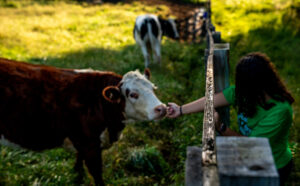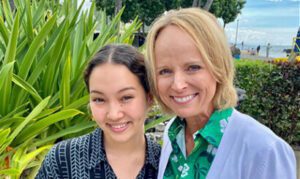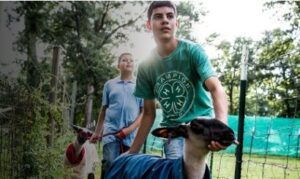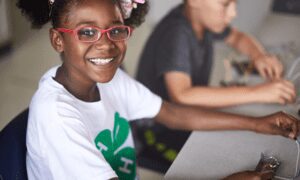
During my time at the forum, I met Lazarus Lynch, two-time champion of the Food Network show, Chopped, host of Snapchat’s first cooking show Chopped U, the founder and face of the “Son of a Southern Chef” brand, and most importantly, a 4‑H Alumnus. He is also the host of Comfort Nation which launches on Food Network’s social channels and website on Tuesday, July 10th. Mr. Lynch was the moderator of a panel of professionals who are working towards solutions to the issue of food insecurity, as well as a speaker following the panel, answering a few questions himself.
So, tell me a little about yourself.
Lazarus Lynch (LL): I grew up in New York City in a place called Jamaica, Queens, and I grew up in a big family. My dad became a chef when I was 10 years old, and I remember just falling in love with the kitchen. Anything my dad made, I wanted to be there! [As an entrepreneur], he opened a restaurant, and I remember following in his footsteps. I wanted to be at the restaurant, I wanted to learn how to cook, and I started to take it seriously.
Before that, I was into painting, music and art. But, culinary [arts] just sort of entered into my path. I went to Food and Finance High School for cooking, and my intention was to graduate and become a chef. But life sometimes has a way of surprising you in the most interesting ways, and one of the ways life did that for me…was through 4‑H.
I was in the 9th grade, and I remember participating in an afterschool program called EATWISE, which stood for “Educated and Aware Teens Who Inspire Smart Eating.” Pretty clever. After school, we would meet and talk about nutrition, health & wellness, and we made smoothies! Then, I got a job that summer working for Cornell University Cooperative Extension, and I was in the nutrition department. We would go out into schools and camps, teaching nutrition classes. It was a good gig!

In the middle of my summer, a woman who worked at the office asked me, “Have you ever heard of 4‑H?” I replied, “4-what?” She told me what 4‑H was, and I said, “OK, that sounds great, but, I don’t know if it’s for me!” She said there was a spot open for an opportunity to go to Washington, D.C., for 3 or 4 days, and asked if I would be interested in going. Long story short, a few weeks later, I was in D.C., and I was with a group called 4‑H. I remember thinking, “I’ve found my community, I’ve found my people.” They cared about things, they cared about the world, they cared about issues. So I became a 4‑H’er and I never looked back.
I’ve continued to be part of 4‑H, and continue to serve nationally for 4‑H as a member of the National 4‑H Council Board of Trustees, globally as a conference speaker, and I’ve also been able to champion for 4‑H through my work in the culinary industry. When I won Chopped and had the opportunity to choose a charity of my choice to donate $50,000 to, my charity of choice was 4‑H. It was obvious to me that 4‑H should be the recipient, because of all that it’s done for me and all that it’s meant to me and for my life and my livelihood.
I grew up thinking that college wasn’t even an option for me. I had no examples of college in my life. I had always heard of it, but I thought it was for smart people. I thought it was for people who were not like me. 4‑H really showed me that college was for me and that I could do it! I was exposed to Ivy League colleges, and we would go to Cornell University, the land-grant university for New York State 4‑H, which provides all the funding for the 4‑H program. It opened up my world, it opened up my heart, it opened up my mind. When I look back and think about where I am today, I would be remiss if I didn’t include 4‑H because it really is my story.
Wow…
LL: That’s all about me, that’s pretty much your interview!
(chuckles) Yeah, the first question I had was “Where did your experience with cooking start?” You already told me that! So, how did 4‑H help you develop your knowledge of food and cooking?
LL: Well, I think EATWISE was actually the first time I thought of nutrition as something that I could control. I always saw nutrition as something on a label, but when I started to learn about cooking and I started to learn about nutrition, I realized that I get to control the preservation of certain nutrients or the elimination of certain nutrients by overcooking something, and I really get to control that.
So, what was it like in 4‑H when you were a kid?

LL: I didn’t have the story that other 4‑H’ers had where their mother was in 4‑H and their grandmother and their father… I didn’t have that history. I sort of joined in high school. I joined pretty late when you look across the trends of when and how people join 4‑H, and it was like the happiest accident. [Well], it wasn’t an accident at all, it was [the way it was] supposed to be. But my experience was fun. I had so many friends and people who were just cool and who loved to do things in the community, so I did a lot of giving back. There was a lot of community activism happening, even as a teenager. We would do protests [on] police brutality, we were talking about issues like bullying and cyberbullying, and we were discussing very current issues.
And I think the other thing too that really helped me was the public speaking. We did a lot of preparing for speeches, which I also learned in high school. So, I was very prepared! And also more advanced in that way. But again, I think that’s one of the beautiful things 4‑H does. It really prepares you today to be the leader tomorrow. It prepares you today to ask big questions and to think critically and to be creative, and it empowers you to believe that what you actually think matters.
And, I find that really interesting, because I know for me and most of the people I know, we were basically born into 4‑H. But, you discovered it and found a place that you belonged and a place that you could learn from. You don’t see that, at least for me, every day in my 4‑H community. So, what or who inspired you to become a chef? And you kind of already answered that…
LL: My dad.
Did you ever help out with the cooking at the restaurant?
LL: I would go to the restaurant a lot after school and help my dad out. I did a lot of dirty work; I didn’t do a lot of fun cooking. I swept and I mopped, and I occasionally did dishes, restocked the soda machines, and broke down boxes. So yeah, I did help him out and occasionally I would try to influence his cooking style.
Did he ever listen to you?
LL: He sometimes… mostly no. (chuckles) No, he heard me, but I don’t think he actually applied anything I said. But I think it was fun to be able to sort of show my dad that there was another way to do the same thing and to show him a different path and also to educate him on nutrition. My dad didn’t have much education in nutrition so I was like, “Dad, I think you should add salads to your menu.” And he did! I don’t think he would’ve done that had I not offered that feedback.
What do you think communities can do today to improve food access for tomorrow?

LL: A community really starts with a single person. It starts with a shared set of values and principals and a shared set of goals. And until communities can come together and agree that what is going on with their neighbor is also going on with them, that what is happening next door is also your problem, until we as a culture, as a society, get to that place, it’s going to be challenging. But, what I will say is that every community member has a responsibility to do what they can. Whether that is using social media to advance the message of food security, or if you’re a writer, writing about it. There are ways to advocate and ways to do. And the ways to do are to serve at local food banks, become a member of your community food pantry, or even a more nationally recognized non-profit organization that serves people in need.
I think at a legislative, political level, it’s urging your representatives to get involved and to take action. One of the things I did in high school was I saw that my community was a food desert and it was a problem. So, I wrote letters to congresswomen and congressmen, urging them to change it. I think we have to keep doing and we have to remain hopeful that change is possible in our lifetime.
Dr. Norman E. Borlaug–you should look him up–said that food is a moral right to all who are born, and that is the absolute truth. He also said that the issue of hunger is solvable in our lifetime. So, we have to begin to do a lot of healing work and that healing work starts with the person. Teaching ourselves and training ourselves to be more compassionate human beings, more empathetic, and more aware of our responsibility in the world. Until we are clear about that, we will always have hunger, we will always have inequity with food, and it’s just not right and it can change, it can totally change.
How do you think we can get people, most importantly youth, more interested in nutrition? Because I know I, earlier today, given the choice for lunch if I wanted to eat the peanut butter sandwich and apple I packed at home or eat Chick-fil-a, I chose Chick-fil-a. So, how would someone like me and other youth my age get more interested in choosing more nutritional options?
LL: I don’t know that I have the answer, but I think it starts with accepting that you love what you love. Accept that you wanted Chick-fil-a! Accept that, don’t fight that. I really believe in nutrition awareness and [the] holistic approach. Live a healthy life, and living a healthy life means you make choices for yourself that serve your best self.
Create an idea in your mind of what that is for you to be your best self, whatever that looks like for you, and think about what food that is for you, and you work towards that. Now, if you want a Chick-fil-a burger, you’re welcome to have it, but is that what your best self-looks like eating that every day? I can’t answer that for you, you have to answer that for you. And you also have to use the information available to you to make decisions that serve that vision for your best self.
It’s being aware of your choices and it’s being clear about what the best is for you. I think it’s obvious that people should eat fruits and vegetables, but that has to be an intentional part of your lifestyle. You can practice that in small ways. You can say, “Ok, I’ll eat Chick-fil-a for lunch, but I’m going to have that apple with it.” You don’t have to completely dismiss the apple because you have the Chick-fil-a. It’s about including what you like in ways that support what you want to be and how you want to feel. So that means being in touch with that.
I also live from the inside-out. I know if I eat an ice cream cone, I’m going to feel sluggish and slow. So, do I want the ice cream cone? Absolutely. And I’m clear with myself that I want it and I love it and I’m going to have it! But I’m not going to have it before I have a presentation because I know what it’ll do to my body. So, it’s about exercising that. Does that make sense?
Yeah, definitely! Lastly, what advice do you have for young aspiring chefs and kids with an interest in food science?

LL: Mmmm… I’ll answer the food science question first. I think I was so blessed to be able to have the experience in high school where food science was a part of my curriculum, and I was also very blessed to have an experience abroad where all I did was food science for three months. That’s very rare, and it’s a blessing. It’s just something that doesn’t happen [very often]. But, I think if you want to go into food science, I would say to start listening to news about it, start watching and reading, start listening to podcasts, and engage your mind in the conversation.
I think sometimes we think because we can’t do something right now, or we can’t afford [it], or because we’re not in a community that has this program, that we can’t engage in it. We live in 2018, so you can engage in it at a mental level. You can watch videos on YouTube, you can read about it, you can borrow books from the library. You can engage your mind even when you can’t engage your body yet. When you engage your mind, you’re preparing yourself so that when your body meets the moment, you’re ready for it. If you’re in 4‑H, take advantage of the amazing Healthy Living programs available to you, such as 4‑H Food Smart Families, which provides support to families and communities to maintain a smart, healthy lifestyle on a budget.
If you want to be a chef, [the advice is] a little more practical: Cook. Something. Every day. Something different, something original, and cook because you love it and not because you want to impress anyone or because you want to be cool. Cook because you love it. For me, I love cooking, not just because of the eating–that’s a huge part of it, and a huge reward–but I love cooking for the process of it.
I’m always learning, and I’m seeing what the water does when the pasta hits the hot water, and I’m seeing what the salt does when it hits the hot water; I’m seeing what the butter does when it melts in the pan, I’m seeing the sizzles and the bubbles. All of those chemical reactions that are happening is what makes it exciting for my eyes, it’s what makes it exciting for my ears. My senses come to life when I cook. So, try to engage it from that standpoint and all will go well for you. All will be well.
I really enjoyed interviewing Mr. Lynch. His idea of engaging your mind on the topic of food science even before engaging your body was very thought-provoking. And I’d be lying if I didn’t tell you his advice for young chefs was extremely inspiring to me and I hope, to all of you.
At the forum, we also discussed action plans that we planned to put into effect in our counties to fight the problem of food insecurity. Our county’s action plan is to introduce more education about the importance of community gardening and of preserving the Maryland agricultural scene. Some ways we’d do this is establishing 4‑H affiliated clubs within the county school system, promoting the establishment of farmers markets (particularly in communities and towns that don’t have as many), creating community gardens, promoting aquaponics, and more. We also want to introduce more distinct cultural food options since our county has some of the most diverse cities in the country, ensuring not only that food options grow, but also that everyone is treated the way they want to be treated.
In the future, I hope in my county, more people in some way can have some easy affordable way to go out and get the healthy, nutritious and locally grown produce that we are seeking to bring more of into our county communities. It won’t be an easy task, but with the help of Maryland and Montgomery County 4‑H, our peers, our communities, and the legislators in our county, we hope to make all of our wishes and hopes a reality. We aren’t just trying to eradicate food insecurity, we are doing it.
















